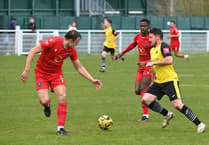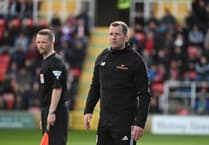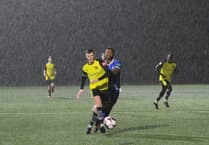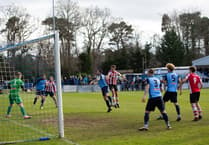Last season was a huge success. Did that come as a bit of a surprise?
We wanted to accomplish more than the season before – a top-half finish would have been a step up, a top-ten finish was where we had set our goal.
To find ourselves from October onwards bouncing between third and fourth exceeded all our expectations.
At the start of the season, if you had told anyone in this town who supports the club that we would be in a position to host a play-off game, they would have bitten your arm off.
I’m really pleased with Darren’s first year of recruitment – we couldn’t have scripted it any better.
It was the team’s best finish in almost 30 years.
Will it be hard to maintain that form for a second season?
The challenge a season like last season creates is expectation. It’s not going to be like that every year. It’s all about trying to be consistent.
We have a bigger squad than last year. We didn’t extend the contracts of some players, a couple found opportunities in higher leagues – and we wish all those players all the best, as they all played a part in our success last season.
We brought in eight new signings and two loans.
Are you excited by the quality of the side?
Oh yes. I think we have a better team this year than last year, and we had a very good team last year.
But it’s not all about who has the best players or who spends the most money – and that’s never going to be this club. It’s about a little bit of luck, a little bit of patience – the key thing has been the way the supporters have treated our players, and the way the players have responded, week in and week out. That drives performances.
You can never under-estimate the role of the 12th person. It means a lot to these players.
Has it been hard finding the right type of players for Woking?
It’s about finding the right attributes which complement the style of the way we play. It’s a changing room that is built on character.
Character can make a good team great and, if you don’t have the right characters in the room, a great team poor.
That’s what Darren has done so well.
Is it difficult competing against clubs who are not afraid to really splash the cash and throw money around to try to buy success?
The success of last year, and with the pedigree of our manager, our assistant manager and our goalkeeping coach, you have a great management team and players have come to trust us.
If we say we are going to do something we do it, and that’s really important.
We are trying to build something here and the mindset of the players has to be on board with that.
Darren met with dozens and dozens of players during the close-season and even though some of them might have been good players, they might not have been the right players for us. We have to make sure the players are exactly what we need.
With all the new players coming in, and the success of last season, does that mean Darren is under a lot of pressure to do well this season?
There’s a lot of pressure on all of us. There’s pressure every time the players step across the white line.
The biggest thing is managing expectations. We anticipate we will have another good season but to say our goal is to win the league is a bit too ambitious.
We want to be in and around the play-offs and every day we are in the top ten then it’s calm, calm, calm.
What’s the vision for the club? Where would you like to be in the next five years. In the Football League?
We’d like to be in the League now! That’s the goal.
When a business partner and I took the plunge and came here, the goal was to be in the League in three years. This is year three.
It doesn’t mean we give up and take our toys back across the pond if it doesn’t happen.
It means we have to continue to work harder.
But with any organisation, if you bring in the right people you increase your odds of success.
Last year we finished with 82 points and came fourth. Most years that would have won the league.
We have brought in new players and that gives Darren some interesting selection issues – a lot of players who played only a minor role last year are really coming into their own – and that’s the kind of problem a manager would relish.
I’m always very optimistic but at the same time I am realistic. I’m never going to say something like we are going to run away with the league – that’s not appropriate. It’s a very tough league.
If people thought that Wrexham and Notts County going up would decrease the pressure, they don’t follow this league much.
You’ve got Oldham throwing money around, you’ve got Chesterfield who have always been up there – we may be in the top ten for budgets, but there will be teams with a budget that is double ours, or two and a half times.
But last season we finished above four or five teams like that.
It’s not about money or budgets – it’s about recruitment and getting the most out of the players.
If we get players who buy into our philosophy – and we don’t sign them if they don’t – of how we play, because if you look how this team play now compared to two years ago, it’s almost a different sport.
How did you end up in Woking? You’re American, not a local!
I first came across to England in 2016. I had never been to a professional match before, although I had seen hundreds on TV, and the first match I went to was QPR against Bristol City in the Championship.
It was at Loftus Road at the end of the season and it was an amazing experience.
The next day I saw Spurs thrashed by Southampton – and I was absolutely hooked.
When I went home I decided I would come back in the December and I sent out 40 to 50 messages. I was running high-performing baseball teams in the States and I reached out to general managers, CEOs, commercial directors – and out of all those, I got one response, from Ivor Heller, one of the original founders of the phoenix club AFC Wimbledon.
So we had a meeting on a dismal Friday night in December.
It’s funny – I arrived as a Spurs fan, then over time it was Spurs first then Wimbledon, and then it flip-flopped – and clubs like Wimbledon and Woking, you’re a person, you’re not just a number.
At Spurs I’m just a client reference number.
If I get a day off and we’re not playing, I will go to Wimbledon – I have a lot of friends there.
After a couple of years I was keen to get more involved and Ivor helped set up a couple of meetings with clubs in the National League. The rest is history.
What was it about Woking that attracted you to the club?
There’s the location and catchment area. We are barely scratching the surface with the catchment area.
We are doing small things with big companies and over time we want to do big things with big companies.
We have some tremendous local partners who support the club because they are part of the community. People like Boz’s Fruit & Veg – they’re amazing people, and we have their name on the front of our shirts. They go above and beyond constantly to help us to be successful.
I wanted to be close to the city and being close to London means I’m closer to friends, although they tell me they saw more of me when I lived in the US than they have in the past two years I have been in the UK.
Wimbledon isn’t far but we both play matches on Saturdays and Tuesdays. If we play away on a Tuesday night, sometimes I don’t get back to my flat until 4.15 the next morning.
It’s easier to get away for a weekend – I’ve done it a couple of times, going to Madrid and Lisbon, and we’ll have a game postponed this season and I’ll try to get away. I’m not sure where – I’ll throw a dart and go somewhere because it’s so easy.
And then there are the people.
Obviously the football side of things drive everything we do – it doesn’t matter how cold the beer is, although it helps; it doesn’t matter how hot the hot dogs are, although it helps; it doesn’t matter what the kit looks like, although it helps. The most important thing we can do to increase our supporter base, and to get more attention on us as a club, is to win.
I came from a business where winning didn’t mean anything until you got to the play-offs. We were playing 140 baseball games over 150 days. If a fan couldn’t make it on a Monday, then they’d just go on the Tuesday.
When we came in, we wanted our business ambition to drive our football ambition, but I think the football has been dragging along the business.
We have been learning a lot on the fly, but we are making changes for growth. Sometimes those changes aren’t popular.
If I had my way, we’d be cashless but we still have a segment of our fan base which don’t want to pay by card, they want to use cash, so we haven’t made the switch.
In the States, as soon as Covid was over, there was no more cash. You’d be amazed at how revenues go up with no more cash.
What plans do you have long-term for the club?
We know a successful football team can lift the whole community, and that’s what we want.
We will be submitting a planning application to expand the fans’ zone into the car park and to add a box office, which will make buying tickets a whole lot easier.
We are focused on improving our matchday experience which already is light years ahead of where it was even a couple of years ago.
We need to focus on our core business, which is winning football matches, because that will driving everything else.
Win more matches, and you sell more tickets. Sell more tickets, you sell more food and beverage. Sell more tickets, you sell more merchandise. Sell more tickets, and that’s more eyeballs for our commercial partners.
In my former business, the centre of everything was marketing. Here, the centre of that circle is the first team. Marketing is the lubricant which keeps the gears turning.
The changes have been amazing. Our head of catering and events has had 300 rentals in a calendar year for different spaces in the football ground.
When we get to a point when we are ready to invest in the facility, part of that will be focused on conference space and being a venue where people know where they can come – and it’s not just somewhere for just 30 matches a year.
It’s about the other 335 days a year when people can be booking events, and for the club to be a real part of the community.




